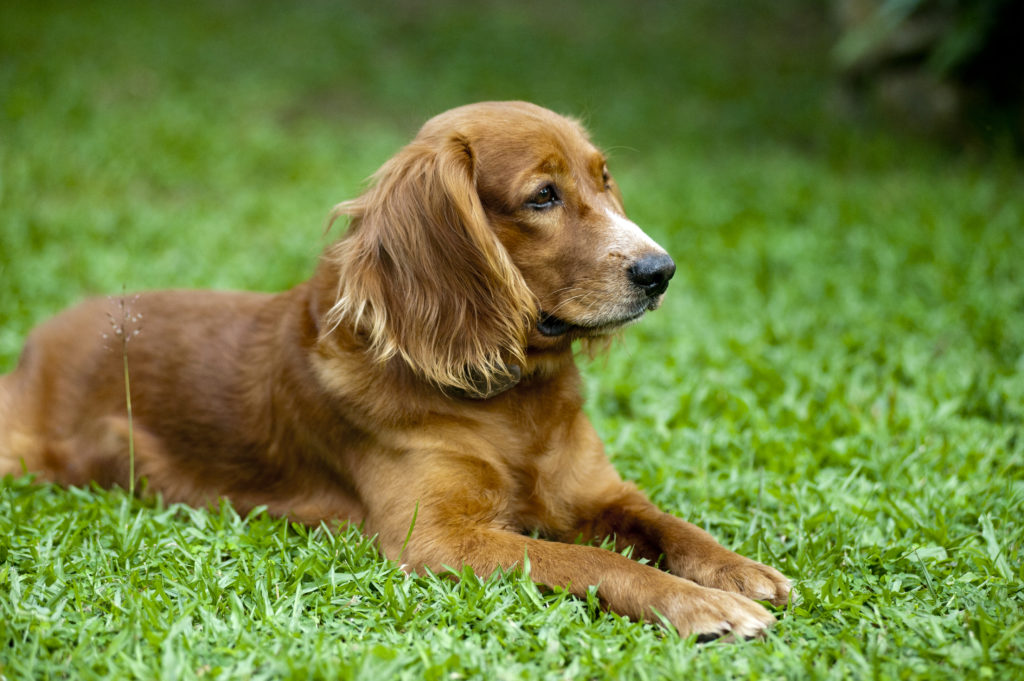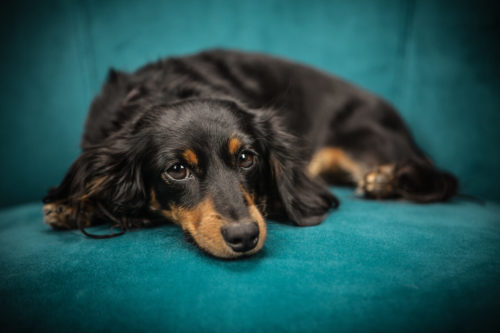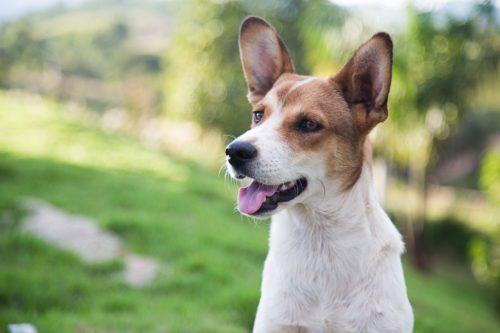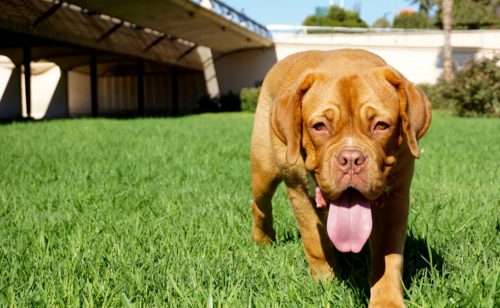When your dog is constipated, it has everyone feeling bad. Your pup is uncomfortable because he can’t expel his waste, you’re unhappy because your dog is unhappy, and everyone wants to find a cure. If your dog can’t poop, there is no doubt that you’re going to be concerned! This article will look at symptoms to watch out for if you think your dog is constipated, what causes constipation in dogs, and what to do if your dog is constipated.
Signs of Constipation
The first and most obvious sign of constipation is when your dog struggles or is unable to poop. Constipation generally includes difficult, infrequent, or non-existent bowel movements and is one of the most common digestive problems in pets. In addition to not being able to have a bowel movement, constipation may also include dry, hard stools and visible straining or pain when trying to poop. Some dogs who are experiencing constipation may also pass mucus in their stools.
The most common signs of constipation include:
- Inability to poop
- Irregular or infrequent bowel movements
- Mucus in the stool
- Dry, hard stools
- Visible pain, crying or straining when trying to defecate
Now that you understand the signs of constipation, you can dive into some of the most common causes of constipation.
Causes of Constipation
More often than not, constipation in dogs is a side effect of something else going on. Because it’s so common, that reason can range from a digestive issue to an allergy to stress. Some of the most common causes of constipation in dogs include too much or too little fiber, lack of exercise, blocked anal sacs, enlarged prostate, an adverse reaction to medication, and many more.
Fiber
Just like humans, fiber is a dietary supplement that plays a major role in digestion. If your dog has too much, or more commonly too little, fiber in their diet they may experience constipation. Unfortunately, many of the commercial dog foods we feed our dogs today have too little moisture and sources of fiber that are hard to digest. Dogs are natural carnivores, which means that when a dry food is made up of corn, gluten, and other grains it can upset their stomach. Pair this with the fact that dry kibble can actually dehydrate your dog and you can see how constipation arises. Consider a wet or raw diet to supplement the moisture that your pup needs.
Lack of Exercise
Exercise is healthy for everyone, dogs included! One reason why your dog might be constipated is lack of exercise. When you take your dog on long walks, it stimulates his digestive system and gets everything moving. This can help him poop healthier. In addition, house trained dogs who aren’t taken on walks enough may get constipated because they are forced to hold their bathroom breaks for so long. Encourage a regular routine so your pup gets used to the poop schedule. This will encourage more regular bowel movements.
Blocked or Abscessed Anal Glands
Ever wonder why your dog always sniffs other dog’s butts? Well, one reason is that he is smelling their anal glands, glands (or sacs) located near the anus that secrete a unique scent. Many mammals, including cats and dogs, have these anal glands and when they defecate, the anal glands secrete a small amount of smell to mark their territory. But when these anal glands get blocked or develop abscesses, they may lead to constipation. They can get blocked for many different reasons, including increased bacteria in the area or stool getting in the way. If this is the case, you, your vet, or your groomer may have to clean these glands out. The good news, though, is that when treated properly, these blocked anal glands shouldn’t have an effect on your dog’s overall health and hopefully, he will be back to pooping in no time.
Enlarged Prostate Gland
The prostate is what’s called an accessory sex gland, meaning that it is part of a male dog’s reproductive system, but it isn’t responsible for sperm production. It is located near a dog’s rectum and colon, which means that when it is enlarged, it can cause a variety of problems, including constipation. The canal through the pelvis, through which waste passes, is a fixed size in each dog. Therefore, when the prostate increases in size, it pushes up against a dog’s rectum and makes the pelvic canal smaller. Then, when the dog needs to poop, he will strain to push it through, causing pain, constipation, and pain on the enlarged prostate.
Excessive/Too Little Grooming
Especially for dogs with long hair, excessive dog grooming can cause constipation because this fur gets into their poop and it’s hard to digest. Almost like when cats get hairballs, dogs can have large amounts of hair collect in their stool. Opposingly, dogs that don’t groom themselves enough can also experience constipation because they may have matted hair around their anus. This can cause a blockage and inability to poop.
Ate Something They Shouldn’t Have
Dogs are known for eating things they shouldn’t, and depending on the item, this may cause constipation. Some common items that are ingested may include gravel, stones, bones, dirt, plants, toys, or trash. These can all get stuck in the intestinal tract, making it hard or impossible to poop. If you think this may be the case with your pup, make sure to take him to the vet because the object might have to be surgically removed.
Side Effect of Medication
Constipation can be a side effect of different types of medications for dogs. If you notice that your dog has become constipated after being put on a new medication, talk to your vet about this side effect. Depending on the severity, it may go away after your dog’s body adjusts, or it could be a reason for prescribing a different medication.
Trauma to the Pelvis/Orthopedic Problem
If your pup has been in an accident, abused, or his pelvis became damaged for another reason, this too could be a cause of constipation. This may be able to be adjusted by a lifestyle change, a diet change, or surgery. Similarly, older dogs might experience orthopedic problems that make it hard or painful for them to do their business. They may have a hip problem or be too inflexible to squat. If this is the case, your vet may recommend surgery.
What to Do If Your Dog Can’t Poop
Finding the right course of action for your dog’s constipation is key to getting them help. The above causes of constipation will have different treatment methods, including diet changes, surgery, or natural remedies.
Diet Changes
As mentioned, fiber and other dietary concerns are usually one of the most common treatments for constipation. Many vets and holistic professionals actually recommend adding pumpkin to your dog’s food because it is a natural diuretic. Start slowly by adding a tablespoon or so to your dog’s food. You can either use freshly pureed pumpkin or canned pumpkin. Make sure that pumpkin is the only ingredient.
In addition to pumpkin, you can also add bran, steamed green beans, or sweet potato to your dog’s food! Just make sure not to overdo it, as then you may cause diarrhea in your dog with too much fiber.
Another diet change is considering an all wet food or raw diet. Raw food is great for a number of reasons, including increased energy, cleaner teeth, and leaner bodies. In addition, raw food also promotes healthy digestion because it slows down your dog’s eating so they have enough gastric juices to digest their food properly. In fact, you might notice that switching your dog to a raw diet makes them poop a little less, and their poop is less stinky! That’s always a plus. Lastly, raw diets are primarily made up of meat or animal products like bone, fat, and muscle. Think about what a wild dog or wolf would eat – a whole animal that they hunted. Raw diets mimic this natural instinct through natural ingredients. Corn and grain fillers found in today’s commercial dry food can cause constipation.
Surgery
If your dog is suffering from one of the above conditions and requires surgery, this should be done immediately. For example, if he ate something that is now stuck in his digestive tract, that is going to continue to cause constipation and if it can’t come out naturally, it will have to be surgically removed.
Stool Softener
In addition to pumpkin, there are other natural stool softeners available for animals, including dogs suffering from constipation. These laxatives are made specifically for pets, so make sure to never give them human medication. This can be very dangerous to your furry friend.
Increase in Exercise
One of the best things you can do if your dog is suffering from constipation is increasing his exercise, as this is good for his overall health, as well. Longer, more frequent walks will encourage your house-trained dog to go to the bathroom more frequently. They will also help jumpstart your dog’s digestive system with all the running around, jumping, and chasing the ball! If your dog is suffering from constipation, getting things moving in there through exercise can help.
Summary
Constipation is actually a relatively common problem that affects dogs, and it can be caused by a number of reasons. Here, we explained some of the most common symptoms of constipation, a number of causes and why they can lead to constipation, and what to do when your dog can’t poop. In summary:
- Constipation generally includes difficult, infrequent, or non-existent bowel movements and is one of the most common digestive problems in pets. In addition to not being able to have a bowel movement, constipation may also include dry, hard stools and visible straining or pain when trying to poop. Some dogs who are experiencing constipation may also pass mucus in their stools.
- Lack of fiber or too much fiber is a common cause of constipation in dogs.
- Exercise is healthy for everyone, dogs included! One reason why your dog might be constipated is lack of exercise. When you take your dog on long walks, it stimulates his digestive system and gets everything moving.
- Blocked anal glands or anal glands with abscesses may lead to constipation. They can get blocked for many different reasons, including increased bacteria in the area or stool getting in the way.
- An enlarged prostate pushes up against a dog’s rectum and makes the pelvic canal smaller. Then, when the dog needs to poop, he will strain to push it through, causing pain, constipation, and pain in the enlarged prostate.
- Excessive grooming can cause your dog to ingest too much hair and make it hard to pass the stool.
- Too little grooming can cause the hair around your dog’s butt to get matted, which can block the stool.
- Dogs are known for eating things they shouldn’t, and depending on the item, this may cause constipation. Some common items that are ingested may include gravel, stones, bones, dirt, plants, toys, or trash.
- Constipation can be a side effect of different types of medications for dogs. If you notice that your dog has become constipated after being put on a new medication, talk to your vet about this side effect.
- If your pup has been in an accident, abused, or their pelvis became damaged for another reason, this too could be a cause of constipation.
- Diet changes, stool softeners, natural remedies, or surgery can all help a dog that is suffering from constipation.
Sources:
- “Constipation in Dogs: Causes and Treatment.” WebMD, Accessed 22 Dec. 2017. www.pets.webmd.com/dogs/dog-constipation-causes-treatment.
- “Dog Constipation and How to Treat It Naturally.” Healthy Pets, Accessed 22 Dec. 2017. www.healthypets.mercola.com/sites/healthypets/archive/2010/11/11/constipation-in-pet-dogs.aspx.
- “Dog Constipation: Causes, Symptoms, and Treatments.” Cesar’s Way, 19 June 2018, Accessed 22 Dec. 2017. www.cesarsway.com/dog-care/routine-care/dog-constipation.
- Dogtime. “Dog Constipation: Symptoms, Causes, And Treatments.” Dogtime, 23 July 2018, Accessed 22 Dec. 2017. www.dogtime.com/dog-health/294-constipation.
- “Five Ways to Help Your Constipated Dog.” PetMD, Accessed 22 Dec. 2017. www.petmd.com/dog/slideshows/five-ways-help-your-constipated-dog.







